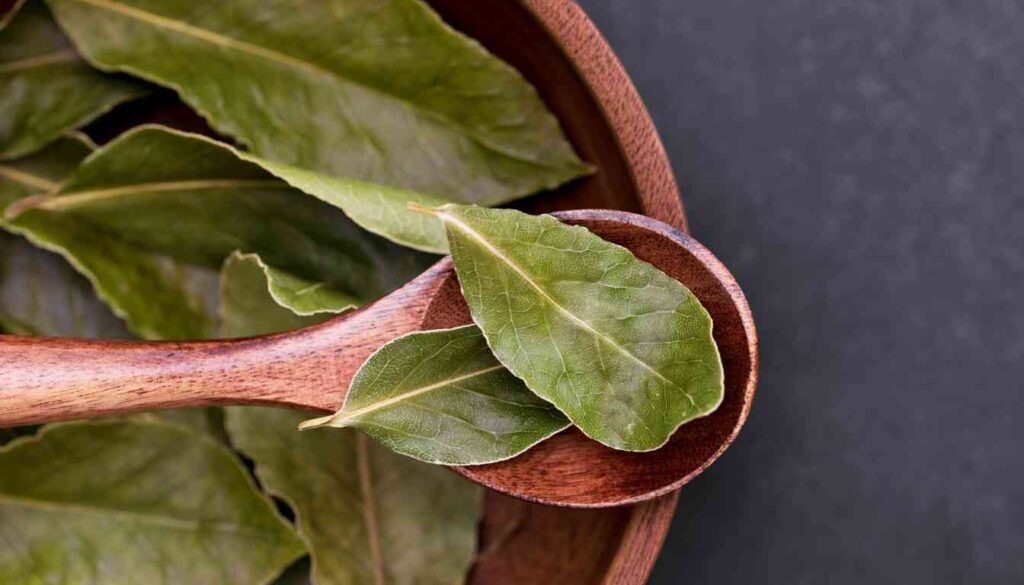Bay leaves, a popular spice in many cuisines worldwide, are cherished for their distinctive aroma and flavor, which can elevate the complexity and depth of various dishes. But did you know that bay leaves also offer several health benefits?
One of the most well-known benefits of bay leaves is their ability to aid in digestion. They contain compounds that can help to stimulate the production of digestive juices and enzymes, which can improve the absorption of nutrients and reduce symptoms of indigestion. Additionally, bay leaves may have anti-inflammatory and antioxidant properties that can help to protect against certain chronic diseases.
Another potential benefit of bay leaves is their ability to support a healthy immune system. They are a good source of vitamin C, which is essential for immune function, and may also have antimicrobial properties that can help to fight off harmful bacteria and viruses. Additionally, some studies have suggested that bay leaves may have anti-cancer properties, although more research is needed to fully understand this potential benefit.
What are Bay Leaves?

Bay leaves are a popular herb that is commonly used in cooking. They come from the laurel tree (Laurus nobilis), which is native to the Mediterranean region. Bay leaves have a distinctive flavor and aroma that can add depth and complexity to a wide range of dishes.
Types of Bay Leaves
There are several different varieties of bay leaves, each with its unique flavor and aroma. The most common type is the Mediterranean bay leaf, which is the variety most often used in cooking. Other varieties include California bay leaf, Indonesian bay leaf, and Indian bay leaf. Each variety has its distinct flavor profile, so it’s important to choose the right type of bay leaf for your recipe.
Nutritional Properties
Bay leaves are low in calories and high in nutrients, making them a healthy addition to your diet. A single bay leaf contains only a few calories but is rich in calcium, iron, and manganese. Bay leaves also contain small amounts of protein, fibre, and carbohydrates, as well as vitamins A and C.
Bay leaves are also known for their essential oil, which is extracted from the leaves and used in aromatherapy and other applications. The essential oil of bay leaves has been shown to have antimicrobial, anti-inflammatory, and antioxidant properties, making it a popular natural remedy for a variety of health conditions.
Overall, bay leaves are a versatile and nutritious herb that can add flavor and depth to a wide range of dishes. Whether you’re cooking up a hearty stew or a delicate sauce, bay leaves are a great way to add complexity and depth to your cooking.
Health Benefits of Bay Leaves
Bay leaves have been used for centuries as a flavor enhancer in cooking, but they also have a variety of health benefits. Here are some of the ways bay leaves can improve your health:
Improved Digestion
Bay leaves contain enzymes that aid in digestion, making them a natural remedy for digestive issues like bloating and constipation. They also help to stimulate the production of gastric juices, which can help to break down food more efficiently.
Kidney Health
Bay leaves have been shown to help prevent the formation of kidney stones, thanks to their diuretic properties. They can also help to reduce the risk of kidney infections by acting as a natural antibacterial agent.
Heart Health
Bay leaves are rich in antioxidants, which can help to reduce oxidative stress and lower the risk of cardiovascular disease. They also contain compounds that can help to lower cholesterol levels and improve blood sugar control.
Diabetes Management
Bay leaves have been shown to help regulate blood sugar levels, making them a useful tool for managing type 2 diabetes. They contain phytochemicals and flavonoids that can help to improve insulin sensitivity and reduce the risk of complications associated with high blood sugar levels.
Antioxidant Properties
Bay leaves are a rich source of antioxidants, which can help to protect the body against the damaging effects of free radicals. They contain compounds like linalool, which has been shown to have potent antioxidant properties.
Respiratory Conditions
Bay leaves have been used for centuries to treat respiratory conditions like asthma and bronchitis. They contain compounds that can help to reduce inflammation in the respiratory tract, making it easier to breathe.
Anticancer Properties
Bay leaves contain compounds that have been shown to have anticancer properties, particularly when it comes to breast and colorectal cancer. They contain phytochemicals that can help to reduce the growth of cancer cells and prevent the development of tumors.
Antimicrobial Protection
Bay leaves have natural antibacterial and antifungal properties, making them a useful tool for preventing infections. They can help to protect against a variety of bacterial and fungal strains, including those that are resistant to antibiotics.
Inflammation Reduction and Wound Healing
Bay leaves have been shown to have anti-inflammatory properties, making them a useful tool for reducing inflammation throughout the body. They can also help to speed up the healing process for wounds and injuries, thanks to their antimicrobial properties.
Overall, bay leaves are a versatile and beneficial herb that can be used to improve a variety of health conditions. Incorporating them into your diet can help to improve your digestion, kidney health, heart health, diabetes management, and more.
How to Use Bay Leaves

Bay leaves are a versatile herb that can be used in a variety of ways. Here are some of the most common ways to use bay leaves:
Culinary Uses
Bay leaves are a popular spice used in Mediterranean and Indian cuisine. They are commonly used to flavor soups, stews, and sauces. Bay leaves can be used in their dried form or ground into a powder. They add a subtle, earthy taste to dishes and can be used to enhance the flavor of meat, vegetables, and grains. Bay leaves are often used in a bouquet garni, which is a bundle of herbs used to flavor stocks and other liquid dishes.
Health and Beauty Uses
Bay leaves have been used for centuries for their health and beauty benefits. They are rich in antioxidants and have anti-inflammatory properties. Bay leaves can be used to treat dandruff, muscle and joint pain, and skin infections. They can also help reduce gas and bloating. Bay leaves can be consumed in capsule form or used topically in essential oil form.
Insect Repellent
Bay leaves can be used as a natural insect repellent. They contain compounds that are toxic to insects, including mosquitoes, flies, and cockroaches. Bay leaves can be placed in areas where insects are common, such as near doors and windows.
Use in the Cosmetic Industry
Bay leaves are used in the cosmetic industry for their fragrance and anti-inflammatory properties. They are often used in perfumes, soaps, and lotions.
Air Freshener
Bay leaves can be used as a natural air freshener. They have a pleasant aroma and can be placed in a bowl or sachet to freshen up a room. Bay leaves can also be added to potpourri or used in homemade cleaning products.
Overall, bay leaves are a versatile herb with many uses. They can be used in cooking, health and beauty, insect repellent, cosmetics, and air fresheners. When using bay leaves, be sure to use them in moderation as they can be overpowering if used in excess.
Healthy Recipes Using Bay Leaves
Bay leaves are a versatile herb that can be used in a variety of dishes. They add a subtle flavor to soups, stews, and sauces, and can even be used to infuse water and tea. Here are two healthy recipes that use bay leaves:
Bay Leaf Water
Bay leaf water is a simple yet effective way to reap the benefits of this herb. Simply add a few dried or fresh bay leaves to a pitcher of water and let it sit overnight. The next day, strain the water and drink it throughout the day.
Bay leaf water is said to have a variety of health benefits, including aiding digestion, reducing inflammation, and improving respiratory health. It’s also a great way to stay hydrated and add some flavor to your water.
Cinnamon and Bay Leaf Tea
Cinnamon and bay leaf tea is a warming and comforting beverage that’s perfect for chilly days. To make it, simply add a cinnamon stick and a few dried bay leaves to a pot of boiling water. Let it simmer for a few minutes, then strain and serve.
This tea is not only delicious, but it also has a variety of health benefits. Cinnamon is known to help regulate blood sugar levels and reduce inflammation, while bay leaves are high in antioxidants and can help boost the immune system.
Whether you’re looking to add some flavor to your water or warm up with a comforting cup of tea, bay leaves are a great ingredient to have on hand. Try these recipes and see how they can benefit your health.
Before You Go – Bay Leaves Benefits

Bay leaves are a versatile herb that offers a range of potential health benefits. They are a good source of vitamins A, B6, and C, which support the immune system and help fight free radical damage. Bay leaves also contain antioxidants that have been shown to help neutralize harmful molecules called free radicals.
Furthermore, bay leaves have been traditionally used to treat respiratory disorders, gastrointestinal discomfort, diarrhea, and amenorrhea. While few human studies have examined the health benefits of bay leaves, preclinical studies have shown promising results.
However, it is important to note that bay leaves should be used in moderation, as they contain a compound called eucalyptol that can cause allergic reactions in some individuals. Additionally, pregnant women should avoid consuming bay leaves, as they may stimulate the uterus and cause contractions.
Overall, incorporating bay leaves into your diet can be a simple and flavorful way to potentially support your health. Whether you add them to soups, stews, or sauces, bay leaves can provide a range of potential benefits.
Linking Bay Leaves Benefits with TheHerbProf.com
Bay Leaves Benefits and TheHerbProf.com are like a perfect herbal tea blend! Let’s see how they enhance each other.
First, let’s talk about Bay Leaves Benefits. These leaves are more than just a kitchen staple. They’re packed with health benefits that can boost your well-being. It’s like having a mini pharmacy in your spice rack!
Now, let’s turn to TheHerbProf.com. This website is a library of herbal knowledge. It’s the perfect place to learn about the properties and uses of the herbs you’re using, like bay leaves.
So, how do they help each other? Well, Bay Leaves Benefits gives you a practical way to use herbs for health. Meanwhile, TheHerbProf.com provides the knowledge you need to understand why these herbs are beneficial.
References – Bay Leaves Benefits
Little Herb Encyclopedia, by Jack Ritchason; N.D., Woodland Publishing Incorporated, 1995
The Ultimate Healing System, Course Manual, Copyright 1985, Don Lepore
Planetary Herbology, Michael Tierra, C.A., N.D., Lotus Press, 1988
Handbook of Medicinal Herbs, by James A. Duke, Pub. CRP Second Edition 2007
The Complete Medicinal Herbal, by Penelope Ody, Published by Dorling Kindersley
Check the Following Articles!
Oregano Oil Benefits: A Deep Overview
Wild Oregano Benefits: Unfair Health Advantages Now!
Tulsi Holy Basil Benefits: The Ultra Guide
Frequently Asked Questions – Bay Leaves Benefits
1. Where to buy Bay Leaves
Bay leaves can be found in most grocery stores and supermarkets. They are usually sold in the spice section, either in whole or ground form. You can also buy bay leaves online from various online stores.
2. What are the benefits of drinking bay leaf water?
Bay leaf water is believed to have various health benefits. It is said to help with digestion, reduce inflammation, and improve heart health. However, more research is needed to confirm these claims.
3. Bay leaf uses
Bay leaves are commonly used in cooking to add flavor to soups, stews, and sauces. They can also be used to flavor rice, beans, and other grains. In addition, bay leaves are used in traditional medicine for their potential health benefits.
4. Bay leaf side effects
Bay leaves are generally safe when used in small amounts in cooking. However, consuming large amounts of bay leaves can be toxic and cause symptoms such as vomiting, diarrhea, and even seizures. It is important to use bay leaves in moderation and to avoid consuming them in large amounts.
5. Benefits of bay leaves and cloves
Bay leaves and cloves are both commonly used in cooking and traditional medicine. They are believed to have various health benefits, such as reducing inflammation, improving digestion, and boosting the immune system. However, more research is needed to confirm these claims.
6. What does bay leaves do for the body?
Bay leaves are believed to have various health benefits due to their antioxidant and anti-inflammatory properties. They are said to help with digestion, reduce inflammation, and improve heart health. However, more research is needed to confirm these claims.
